**The content of the mentioned works below deals with racial, sexual, and gendered themes that may be difficult for some readers. Consider carefully before reading.**
Contested conversations and debates around literature, even books bans, are nothing new. Unfortunately, we find ourselves during a time when pushes for literary censuring are on the rise, with fervent calls to remove books with references to enslavement, sex, gender, or Queer people. In light of this, I wanted to present a list of only a few Black authors, some of which are women, Queer, or both, so that we can remember and learn from them, and never let anyone take their lessons from us.
W.E.B. DuBois
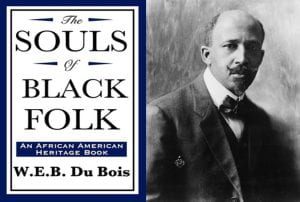
A founding member of the NAACP, W.E.B. Dubois is one of the foremost Black scholars of his era. He was the first Black American to earn a Ph.D. from Harvard University and went on to challenge notions by abolitionist Frederick Douglas and contemporary intellectual Booker T. Washington in his numerous writings and actions. Instead of promoting the ideology that Black people should integrate into White society or compromise rights to make small gains, DuBois loudly proclaimed Black pride.
In his seminal work, The Souls of Black Folk (1903), Dubois coined the now-famous term “double consciousness.” He discussed the irreconcilable double existence Black people lived through in America as both American and Black. Since then, the term has become a theoretical framework for understanding the dynamics of unequal realities and structures.
He attended the founding convention for the United Nations in 1944 and was a leader in the Pan-Africanism movement, organizing a series of Pan-African Congress meetings throughout the world.
He passed away at the age of 95 on Aug. 27, 1963, after moving to Ghana and acquiring citizenship there.
James Baldwin
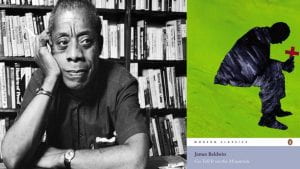
Writing between 1953 and 2011, a mix of standalone novels, short stories, plays, poetry, and non-fiction books, James Baldwin is considered a quintessential American writer. As the grandson of an enslaved person, Baldwin’s work reconciled with the experience of being a Black man in White America. Born in 1924 in Harlem, New York, he was the oldest of nine kids and spent most of his time in libraries.
He spent three years in his stepfather’s profession as a preacher before moving to Greenwich Village and pursuing writing. Even though most of his work was embroiled in experiences of anger and disillusionment, Baldwin always advocated love and brotherhood.
After passing from stomach cancer at the age of 63 in 1987, Baldwin became known as one of the most vocal and prominent voices for equality. He is considered an essential, and enriching, part of the American literary canon.
Alice Walker
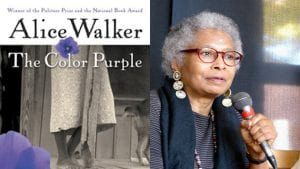
Alice Walker was born in 1944 in Eaton, Georgia. Her parents were sharecroppers and after a childhood incident that left her blind in one eye, Walker’s mother considered her more suited for writing than chores. This talent landed her a scholarship to Spelman College, whereafter she transferred to Sarah Lawrence College and earned a BA in Literature.
After graduating, she moved to Mississippi to join the Civil Rights Movement and married Melvyn Rosenman Leventhal; becoming the first interracial marriage in the state.
Walker is hailed for her rediscovery of author Zora Neale Hurston and her foundational role for Black women authors.
She published her first book of poetry in 1968, Once, and her first novel in 1970, The Third Life of Grange Copeland. Her most acclaimed work came in 1982, The Color Purple, wherein she explores gender, sexuality, and race. She continues to publish to this day and is widely regarded for her insightful portrayal of Black American life and culture.
Toni Morrison
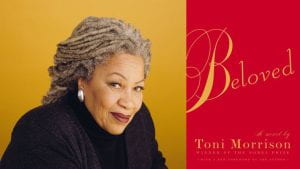
Toni Morrison was born on February 18, 1931, in Lorain, Ohio. Though living in a semi-integrated area, Morrison experienced the cruel reality of racism. At two years old, their landlord set their apartment on fire with them inside when her family could not afford rent.
She turned her attention to reading and eventually attend the historically black institution, Howard College. There she was exposed to colorism and witnessed firsthand how racial hierarchies extended to skin pigmentation within the Black community.
Working within academia throughout the North and South, Morrison eventually settled in an editing career. Though she worked for publishing companies, she did not publish her first novel, The Bluest Eye (1970), until she was 39 years old. However, after (and like) this first work, each of her subsequent novels earned critical acclaim and several awards. In 1987, she released her most-known work, Beloved, which is based on the true story of an enslaved woman. The novel was on the Bestseller list for 25 weeks and won numerous awards, including the Pulitzer Prize for Fiction.
In 1993, Toni Morrison became the first Black woman to win the Nobel Prize in Literature and has also been awarded the National Book Foundation’s Medal of Distinguished Contribution to American Letters, National Book Critics Circle Award, and she was named a Living Legend by the Library of Congress.
As an internationally renowned author, Morrison has left a litany of insightful works from novels to plays and children’s stories. She passed away in 2019.
Ralph Ellison
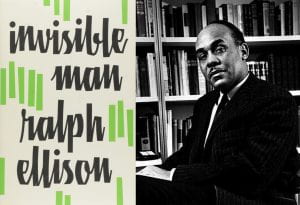
Ralph Ellison was born on March 1, 1914, in Oklahoma City, Oklahoma. He was the grandson of enslaved people. He only ever published one book during his lifetime, Invisible Man (1952), yet this book gained him national acclaim. After his death on April 16, 1994, his second novel, Juneteenth, was published in 1999.
Originally, Ellison had had dreams of becoming a professional musician and had enrolled at the Tuskegee Institute to do just that. However, after traveling to New York City during his senior year to earn funds for his final year, he met Richard Wright (author of the polemic novel Native Son). This, coupled with the onset of the Great Depression, prompted Ellison to embark on his writing career.
He wrote for the New York Federal Writer’s Program, an offshoot of the Works Progress Administration. After the outbreak of WWII, Ellison joined the U.S. Merchant Marine as a cook and began planning for what would become his infamous novel, Invisible Man.
When it debuted, it was on the Bestseller’s List for 16 weeks and won the National Book Award. Forty years later, the Nobel Peace Prize winner, Saul Bellow, stated, “This book holds its own among the best novels of the century.”
Zora Neale Hurston
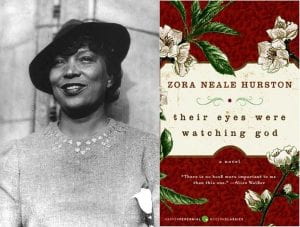
Zora Neale Hurston was born on January 7, 1891, in Notasulga, Alabama, U.S. She is a world-renowned author and one of the first students of the father of anthropology (Franz Boas).
She was the daughter of enslaved parents. At a young age, her family relocated to Eatonville, Florida where her father became the town’s first mayor, in what was the first all-Black incorporated town in the state.
Hurston earned her Associate’s from Howard College before she won a scholarship to Barnard College and graduated with a Bachelor’s in Anthropology. As a student in New York City, she met fellow writers like Langston Hughes and Countee Cullen and joined what is remembered as the Harlem Renaissance 一 a black cultural movement of arts, music, and literature.
She began publishing short stories as early as 1920, though was largely ignored by white mainstream literary circles (though she gained a large Black readership). In 1935, she published her debut novel, Mules and Men, and between 1934 and 1939 wrote three more works. Her most acclaimed novel is Their Eyes Were Watching God (1937) which incorporated her research and literary talents to focus on the life of Janie Crawford, a Black woman whose journey of self-discovery and identity takes her to many places.
She is a pioneering figure of modern anthropology and traveled to Haiti and Jamaica to study African diasporas. Moreover, she chronicled many Black folktales and dialects which she subsequently incorporated into her own writings. While this drew criticism from some contemporary figures, her work celebrated Black language and culture unabashedly.
Zora Neale Hurston passed away on January 28, 1960, in Fort Pierce, Florida. Zora Neale Hurston was long an unsung literary figure but after her rediscovery by author Alice Walker, her works have once returned to print.
Regarded as one of the founders of Black writing, particularly for Black women authors, Alice Walker has said:
“Her work had a sense of Black people as complete, complex, undiminished human beings and that was crucial to me as a writer.”
bell hooks
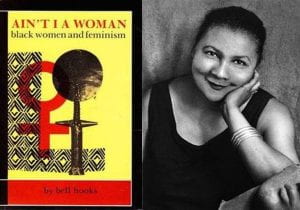
bell hooks, a pseudonym of Gloria Jean Watkins, was born September 25, 1952, in Hopkinsville, Kentucky.
She grew up in a segregated community in the American South which eventually informed her writing. She published her first work, Ain’t I A Woman? Black Women and Feminism (1981), while still an undergraduate at Standford University.
Her pseudonym was fashioned after her great-grandmother’s name in order to honor female legacies and she chose all lowercase letters because she wanted people to focus on the content of her books over her.
hooks was a progressive thinker and scholar whose work engaged with the intricate relationships of race, class, and gender as situated in systems of structural oppression and violence. She educated people on intersectionality well before it became a common word now (essentially pioneering the ideology itself).
She passed away on December 15, 2021, in Berea, Kentucky. You can find a selection of her works here.
Angela Davis
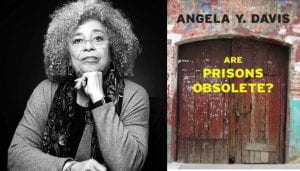
Angela Davis was born January 26, 1944, in Birmingham, Alabama in a neighborhood known as “Dynamite Hill” for the numerous bombings committed by the domestic terrorist group, Ku Klux Klan. She is a philosopher, activist, and former Black Panther and political prisoner who was wrongly accused of participating in the killing of a prison guard after becoming involved in the Soledad Brothers campaign. After that, Davis went into hiding and was placed on the FBI’s Ten Most Wanted Fugitive List, making her the third woman to ever be placed on the list.
An international movement to “Free Angela” led to songs from artists like Yoko Ono, John Lennon, and the Rolling Stones. On June 4th, 1972, she was found not guilty of all charges.
Angela Davis continues her legacy to this day, giving speeches and continuing to write new works that discuss intersectionality, racial disparities and structural violence, and abolition, among a few topics. Her latest book was published in 2022 with her partner, Gina Dent, alongside Erica R. Meiners and Beth E. Richie titled: Abolition. Feminism. Now.
Find more of her works here.
Maya Angelou

Maya Angelou was born on April 4, 1928, in St. Louis, Missouri. She writes across several mediums as a memoirist, poet, author, playwright, and essayist. Her work explores themes such as economic conditions, race, and sexual oppression. She is also renowned for her unique and visionary autobiographical writing styles.
Angelou did not live with her parents full-time during her childhood as a result of divorce and other factors. When she returned from her grandmother’s care to live with her mother at the age of seven, she was raped by her mother’s boyfriend. He was jailed, and upon his release, was killed. Believing that she had somehow had a part in the death of this man, Angelou became mute for the following 6 years of her life.
Angelou displayed her literary talents from a young age but did not become a professional writer until much later in life, around when she joined the Harlem Writer’s Guild in 1959. She was also a prominent activist in the Civil Rights Movement and served as the North Coordinator for the Southern Christian Leadership Conference.
In 1969, she wrote one of her most famous works, I Know Why the Caged Bird Sings, which was an autobiography of her early life, exploring her experiences with sexual abuse. Many schools sought to ban this book as a result of these depictions, but numerous sexual abuse survivors have credited her work as telling their stories.
While she has earned numerous awards, including three Grammy Awards, for her writing she was awarded the National Medal of Arts (2000) and the Presidential Medal of Freedom (2010).
Maya Angelou passed away on May 28, 2014, in Winston-Salem, North Carolina after a long and fruitful career. You can find a list of her complete works here.
James Cone
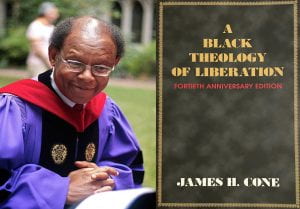
James Cone is a highly influential figure who founded Black liberation theology, alongside, being an outspoken proponent of justice for the oppressed in society. He is known as one of the most widely regarded theologians in America, teaching at the Union Theological Seminary for 50 years and influencing generations of scholars. One such student is currently a senator for the state of Georgia, Rev. Raphael Warnock, who was elected in 2020 as the state’s first Black senator.
Born August 5, 1938, in Arkansas, he grew up during intense racial segregation during the 40s and 50s. Living under the threat of lynching revealed to Cone the immense spiritual and moral depth of Black people, especially as Cone’s own parents taught love over hate when confronted by racial injustice and threats. As a result of his personal experiences and figures such as Malcolm X and Martin Luther King Jr., Cone developed Black liberation theology to challenge the white hegemony of Christian teachings and understanding.
Black liberation theology is informed by six sources which can be summarized as the black experience (slavery, segregation, and lynchings), black culture and revelation, and tradition and scriptural interpretation. He is best known for his political and influential books, Black Theology and Black Power (1969), A Black Theology of Liberation (1970), and God of the Oppressed (1975).
He passed on April 28, 2018, at the age of 79. His latest memoir was written just prior to his passing and is titled: Said I Wasn’t Gonna Tell Nobody.
Octavia Butler
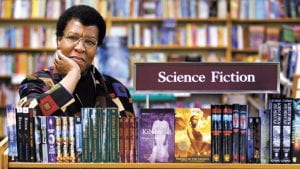
Octavia Butler was born in 1947 in Pasadena, California. She is an author of mostly science fiction novels in future settings, often incorporating unique powers. Her numerous works are known for their synthesis of science fiction, mysticism, mythology, and Black American spiritualism.
Not only was Butler the first Black woman to receive wide acclaim in this genre of fiction, but she was also the first science fiction writer to win the MacArthur “Genius” Award. She has also won several other awards including the Hugo, Nebula, and Locust awards.
In 1975, she published her first novel Patternmaster, which was quickly followed by Mind of My Mind and Survivor: This series is about humanity’s evolution into three separate genetic groups.
Her best-known work, Kindred, was published in 1975 and continues to be taught in high schools, universities, and community reading programs to this day. (There was even a recent television adaption on Hulu.)
Much like other Black women authors on this list, Butler’s work extends beyond race and explores the dynamics of sex and gender, challenging traditional gender roles in works like Bloodchild and Wild Seed. Octavia Butler passed away on February 24, 2006, in Seattle, Washington, but not before securing her legacy in her numerous works.
Conclusion
To learn more about book bans, read the article by Nikhita Mudium: “Book Bans in the United States: History Says it All.”
If you liked this book list, check out the list of contemporary Black authors here.

